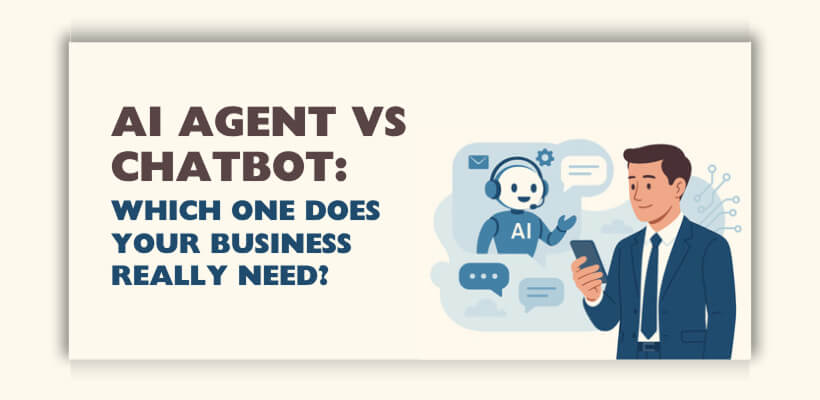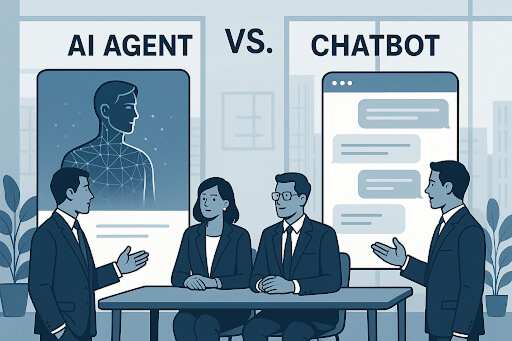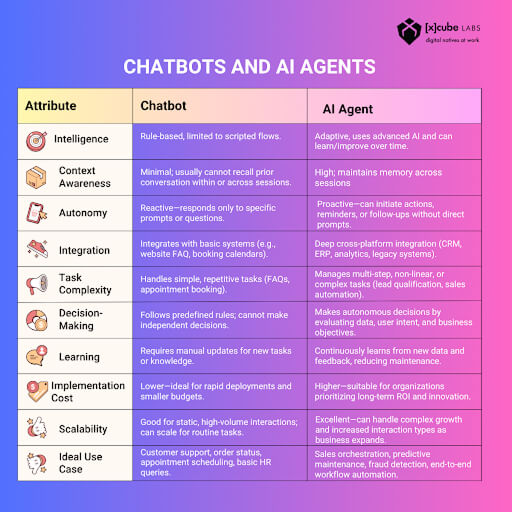 1-800-805-5783
1-800-805-5783 
With technology changing so quickly these days, businesses face a critical decision when implementing conversational AI solutions: should they invest in AI agents or traditional chatbots? While both technologies promise to enhance customer interactions and streamline operations, understanding their fundamental differences is crucial for making the right choice for your business needs.

The distinction between an AI agent and a chatbot isn’t just technical jargon but a strategic business decision that impacts everything from customer satisfaction to operational efficiency. As AI continues to reshape how we interact with technology, knowing when to deploy each solution can mean the difference between a competitive advantage and costly implementation mistakes.
Chatbots represent the first generation of conversational AI technology, designed to simulate human conversation through predefined rules and scripted responses. These digital assistants excel at handling routine and repetitive tasks, as well as providing instant responses to common customer queries.
Traditional chatbots operate using rule-based engines, decision trees, or basic natural language processing (NLP) models that rely on keyword matching and intent classification. They follow a flowchart-like structure, recognizing specific keywords or intents and responding with preprogrammed answers. Modern chatbots may operate within predefined boundaries.
Chatbots prove particularly valuable for businesses handling high-volume, low-complexity interactions. They’re ideal for:
According to recent studies, chatbots can autonomously handle up to 70% of customer queries, providing 24/7 support without requiring human intervention. This capability makes them particularly attractive for businesses looking to reduce customer service costs while maintaining availability.
AI agents represent a significant leap forward in conversational technology, powered by large language models (LLMs), contextual embeddings, and advanced machine learning capabilities. Unlike chatbots, AI agents can autonomously analyze context, make decisions, and execute complex multi-step workflows across various systems.
AI agents employ sophisticated decision-making models to determine the next-best actions, often operating across multiple systems, including CRM platforms, support tools, and DevOps environments. They maintain built-in memory, enabling session continuity and personalized interactions based on previous conversations and customer history.
AI agents excel in complex scenarios requiring sophisticated problem-solving and multi-step execution:
Real-world implementations demonstrate significant ROI. For example, H&M’s virtual shopping assistant resolved 70% of customer queries autonomously while achieving a 25% increase in conversion rates during chatbot interactions.
Understanding the distinction between chatbots and AI agents is essential for making informed technology decisions. Here’s a comprehensive comparison:
Chatbots operate on rule-based logic with predefined scripts, lacking the ability to learn and struggling with unexpected queries. AI agents utilize machine learning and NLP to comprehend context, learn from interactions, and continually refine their responses.
Chatbots excel at performing simple, repetitive tasks, such as answering FAQs or processing basic requests. AI agents manage multi-step workflows, analyze data, and make autonomous decisions suitable for complex operations, such as fraud detection or dynamic customer support.
The difference between an AI agent and a chatbot becomes most apparent in decision-making scenarios. Chatbots follow limited predefined paths or basic responses. AI agents demonstrate autonomous decision-making based on context and goals, capable of breaking down complex problems and executing solutions independently.
Chatbots typically forget past interactions and maintain low context awareness. AI agents build on past data and adapt in real-time, maintaining high context awareness for better decision-making.
Chatbots must be manually updated to handle new scenarios. AI agents continuously learn from interactions and outcomes, automatically improving their performance.

Different industries benefit from varying approaches to the AI chatbot vs AI agent decision:
The decision between a virtual agent and an AI chatbot has a significant impact on budget planning and ROI expectations.
Studies show that chatbots can deliver substantial returns through cost savings and efficiency improvements. Businesses typically save up to 50% of customer support operational costs while increasing conversion rates by 23%. AI agents, although requiring a higher initial investment, offer greater long-term value through advanced automation and decision-making capabilities.
Chatbots are ideal when:
Perfect Scenarios for Chatbots:
AI agents are the better choice when:
Optimal Use Cases for AI Agents:
The conversational AI landscape continues to evolve rapidly, with the distinction between AI Agent or Chatbot becoming more pronounced. By 2027, Gartner predicts that chatbots will become the primary customer service channel for 25% of organizations.
However, the trend suggests the development of more sophisticated AI agents for complex business applications, highlighting why an ai agent is better than chatbot for high-value tasks and why, in some scenarios, a chatbot is better than ai agent for straightforward, high-volume inquiries.
Increased Integration
AI agents will seamlessly work across multiple business systems, demonstrating why an ai agent is better than ai chatbot when you need end-to-end automation spanning CRM, ERP, and analytics platforms.
Enhanced Personalization
Advanced context awareness will enable highly personalized interactions, making a compelling case that an ai agent is better than chatbot for delivering tailored customer journeys.
Autonomous Decision-Making
AI agents will handle more complex decisions with minimal human oversight, showcasing how an ai agent is better than ai chatbot in scenarios requiring multifaceted evaluations and predictive analytics.
Industry Specialization
Vertical AI agents tailored for specific industries will become more common, so businesses must choose between an AI Agent or Chatbot based on their need for domain-specific expertise versus broad conversational coverage.
The choice between an AI Agent or Chatbot ultimately depends on your specific business needs, budget, and strategic objectives. Here are the essential considerations:
| Use Case | Recommendation |
| Quick deployment, predictable queries | Chatbot—a cost-effective solution where a chatbot is better than ai agent for standard FAQs and order tracking. |
| Complex automation, cross-system tasks | AI Agent—where AI agent is better than chatbot for orchestrating workflows and integrating with backend systems. |
| Hybrid support model | Combine both: use a chatbot for initial interaction and escalate to an AI Agent when deeper context or decision-making is required. |
The AI revolution is not about choosing between technologies—it’s about selecting the right tool for the right purpose. Whether you opt for chatbots due to their simplicity and cost-effectiveness or AI agents for their advanced capabilities, aligning your choice with clear business objectives drives real value.
As businesses continue to embrace digital transformation, understanding the distinction between an AI Agent or Chatbot becomes crucial for maintaining a competitive advantage. The technology you choose today will shape your customer interactions, operational efficiency, and business growth for years to come.
By carefully evaluating your needs, resources, and strategic goals, you can determine when a chatbot is more suitable than an AI agent and when an AI agent is more suitable than an AI chatbot, ensuring your organization is well-positioned for future success in the age of intelligent automation.
What is the main difference between an AI agent and a chatbot?
The key difference is that a chatbot operates using rule-based logic and handles simple, repetitive queries. In contrast, an AI Agent uses advanced machine learning to automate complex, multi-step tasks, make decisions, and learn from interactions.
When should my business choose a chatbot over an AI agent?
Choose a chatbot if your business handles high-volume, routine inquiries, requires a cost-effective solution, or needs quick deployment without extensive technical complexity. This demonstrates that sometimes a chatbot is better than an AI agent.
What are the benefits of using AI agents in customer service?
AI agents provide proactive, personalized experiences by understanding context, integrating across multiple systems, and autonomously resolving complex customer problems, resulting in enhanced satisfaction and efficiency. This highlights why AI agents are better than chatbots for deeper engagements.
Are AI agents more expensive than chatbots to implement?
Yes, AI agents generally require a larger upfront investment due to their advanced capabilities and integration requirements; however, they tend to deliver a higher long-term ROI through increased automation and process optimization.
Can my business use both chatbots and AI agents together?
Absolutely. Many organizations deploy chatbots for simple tasks and initial customer handling, then escalate complex issues to AI agents, creating a seamless and scalable digital support experience.
At [x]cube LABS, we craft intelligent AI agents that seamlessly integrate with your systems, enhancing efficiency and innovation:
Integrate our Agentic AI solutions to automate tasks, derive actionable insights, and deliver superior customer experiences effortlessly within your existing workflows.
For more information and to schedule a FREE demo, check out all our ready-to-deploy agents here.